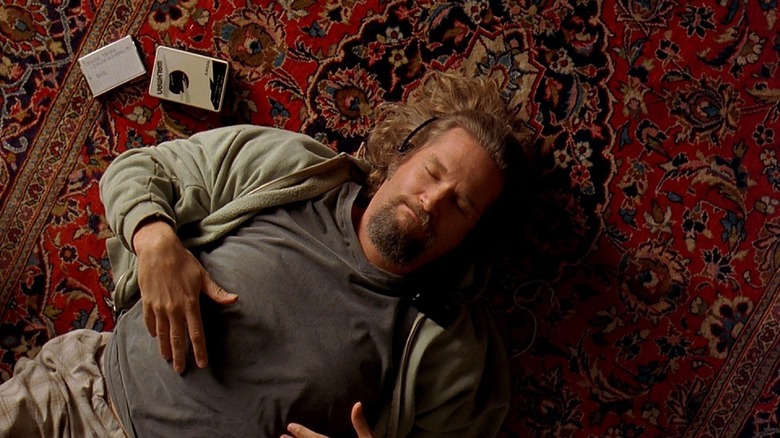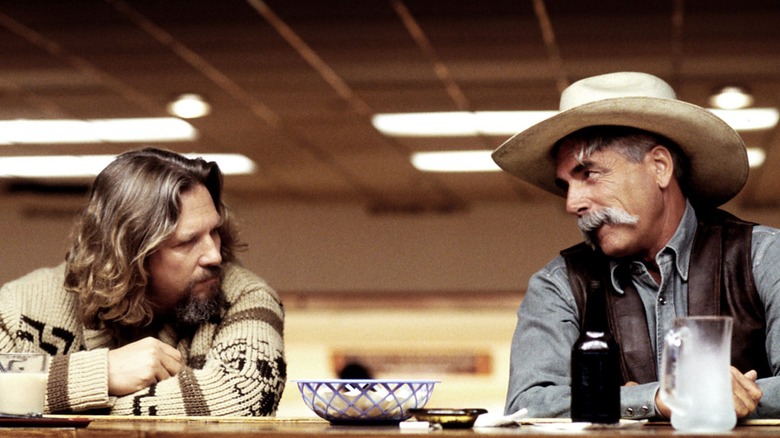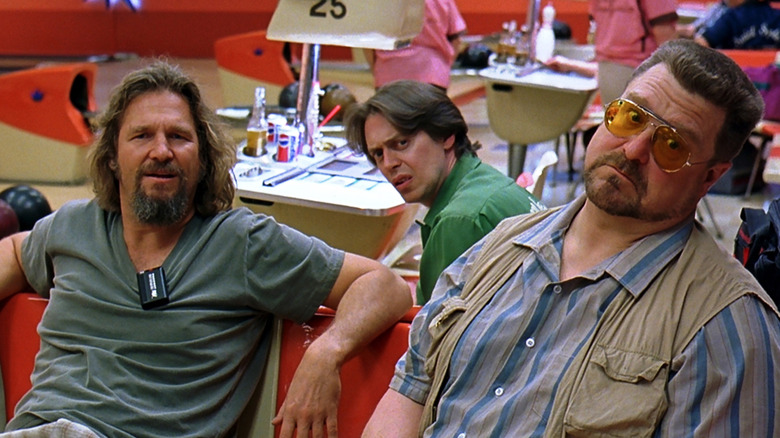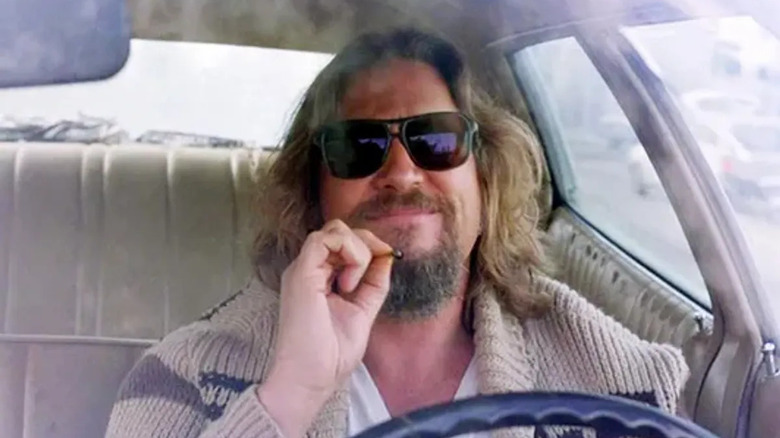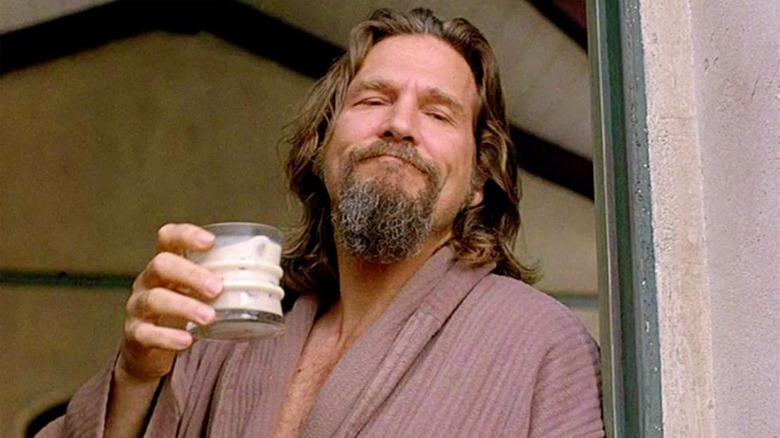How The Big Lebowski Inspired Its Own Religion
My favorite cult movie story goes like this: One Saturday evening in 1982 in the UK, the start of the BBC's football show "Match of the Day" was delayed, causing some impatient viewers to flip over to the other two channels to kill some time. Some landing on BBC 2 found themselves drawn into a wacky time travel farce from Czechoslovakia involving identical twins, suitcase nukes, and Hitler's bunker called "Tomorrow I'll Wake Up and Scald Myself With Tea." Oldrich Lipsky's nutty film never received a theatrical release in the UK and only aired that one time on terrestrial TV, creating an unlikely following among a small group of bewildered footy fans.
Almost anything has the potential to become a cult film if it strikes a chord with the right audience. "The Rocky Horror Picture Show" was a midnight movie staple almost from the get-go, with fans attending screenings dressed as the characters and interacting with the movie via a selection of props. In India, the romantic musical "Dilwale Dulhania Le Jayenge" ran for almost 20 years straight in theaters as whole families repeatedly went back to sing along, quote the dialogue, and fall in love with the movie all over again. When screenings were canceled in 2015, popular demand brought it back and it continues to this day.
Then you have the Coen brothers' "The Big Lebowski," the stoner classic following the misadventures of the perpetually baked Jeffrey "The Dude" Lebowski (Jeff Bridges) as he is drawn into a Chandler-esque kidnapping plot involving soiled rugs, German Nihilists, marmots, suave pornographers, and strongly vaginal artists. As one of the most quotable films ever made, it turned people all over the world onto White Russian cocktails and inspired the long-running Lebowski Fest. Hell, it's a movie so cultish that it even spawned its own religion: Dudeism.
So what exactly is Dudeism?
Dudeism, officially known as The Church of the Latter-Day Dude, was formed in 2005 by Oliver Benjamin, a freelance journalist who came up with the idea of forming a religion based on the film while watching it with a group of fellow travelers in a Thai cafe in 2005. The "Dudely Lama" said (via CNN):
"I felt as if I'd seen a story that put all the difficulties of modern life into a manageable perspective. And it was probably the most touchingly funny film I'd ever seen. Oddly enough, I'd long wanted to start a religion. During my travels I'd become an earnest student of religion and philosophy."
Skip forward 17 years and the Church now has over 600,000 ordained Dudeist ministers around the world and, in the United States, you can legally have your wedding overseen by a clergydude. Not only that, the philosophy has branched out into education with the Abide University and Institute, which hands out free honorary degrees in non-standard fields such as Comedic Science and Rockology, a study of rock music.
Along with Lao Tzu, the founder of Taoism, the site lists other "Great Dudes in History," a wide range of people from the Buddha, Greek philosopher Heraclitus, and Jesus Christ to modern-day dudes like Snoopy, Jennifer Lawrence, and Kurt Vonnegut. Their site states:
"Probably the earliest form of Dudeism was the original form of Chinese Taoism, before it went all weird with magic tricks and body fluids. The originator of Taoism, Lao Tzu, basically said "smoke 'em if you got 'em" and "mellow out, man", although he said this in ancient Chinese so something may have been lost in the translation."
Are these dudes serious?
Although there is plenty of quotes from "The Big Lebowski" and other fun stuff on the Dudeist site, the founders and followers of Dudeism are clearly making a semi-serious attempt to understand the modern world through the filter of the movie:
"People instinctively feel the need for religion. Yet the only religions around are about 2000 years old or more and so can't possibly provide the worldview for a world that's changed so much. Traditional religions have tried to adapt but can't; the Atheist movement has gathered steam but hasn't provided anything to fill the gap where religion used to be. Finally, some who self-apply the handle "New Age" have tried to replace old religions with even older supernatural ideas. Dudeism, on the other hand, takes the essential messages of all the world religions and simplifies them, purging them of all their dogma and superstitions, leaving only the easygoing, useful and fortifying parts."
I spent some time scrolling through discussion posts about Dudeism, and I was surprised by how sensibly many people talk about it. Folks who buy into the ethos report that it makes them less stressed and helps them avoid burnout; find a more relaxed work-life balance and spend more time on leisure activities with family and friends; put less pressure on themselves to achieve and generally do stuff that doesn't really matter in the grand scheme of things; live in the now, and stand up for themselves while also making a conscious effort not to be "Un-Dude" to others. Few claim any great epiphanies, but Dudeism seems to help followers protect their lives from the go-getting grind of Capitalist society, putting a name to abstract ideas that they might have been exploring anyway in pursuit of a less intense way of existing.
So how does Dudeism link up with these older religions?
There are a lot of strands to keep in your head regarding Dudeism, so let's make a few comparisons between Taoism, the Church of the Latter-Day Dude, and "The Big Lebowski" itself. From the Dudeist manifesto:
"Life is short and complicated and nobody knows what to do about it. So don't do anything about it. Just take it easy, man. Stop worrying so much whether you'll make it into the finals. Kick back with some friends and some oat soda and whether you roll strikes or gutters, do your best to be true to yourself and others – that is to say, abide."
This corresponds with the Taoist belief that the Universe has a natural order and the best route to contentment is to attune yourself to nature's ways, and just go with the flow (via Nations Online):
"Wu Wei [inaction] does not signify not acting at all, but rather not forcing things on their way. Wu Wei signifies that action should be immediately in accordance with the Tao, hence the necessary will be done without exaggeration, hyperbole, or overeagerness as these are considered obstructive, though rather in an easy, facile, non-disturbing way, leading to overall harmony and balance. It is a state of inner tranquility, which will show the right effortless action at the right time."
While the character of The Dude is introduced as "possibly the laziest man in Los Angeles county," his attitude is that of a guy who has found inner tranquility. We get clues that he was a political activist in his younger years, as one of the original authors of the Port Huron Statement who spent time occupying various administration buildings. But, at some point, he decided to say "screw it" and become The Dude instead.
The dangers of becoming Un-Dude
With all this in mind, we can read "The Big Lebowski" as a cautionary tale about becoming Un-Dude in your thinking. When we first meet the Dude he is completely content with his spartan existence, enjoying the simple pleasures of listening to whale song tapes in the bath, bowling with buddies, drinking White Russians, and smoking lots of weed. He isn't materialistic at all, driving a beaten-up car and slobbing around in shorts, old T-shirts, and comfy sweaters. He seems happy just to go with the flow, which takes us back to the Taoist principle of Wu Wei:
"Wu Wei could be characterized by the adaptability of the flow of water in a stream... Water flows without awareness, or naturally, downriver. It might be blocked by an object (a branch or a stone), though without contriving to do so, it finds its way around the object. Water acts without motive, it acts with Wu Wei."
Difficulties arise when people attempt to go against the natural order of the Universe. Things get tricky for Lebowski when he acts Un-Dude: While he is right to seek compensation when someone urinates on his rug, stealing a replacement from his millionaire namesake tips the cosmos against him. The "Big" Lebowski sees him as the perfect dupe to unwittingly assist his scheme to embezzle ransom money for his missing wife, causing The Dude no end of trouble. It's only when the mystery resolves itself that he is able to regain his tranquil state.
After a few years of pandemic and lockdown that has caused many people to re-evaluate their lives and seek out what is truly important to them, Dudeism's time may have come. To paraphrase the movie, sometimes there's a religion, well... it's the religion for its time and place.
